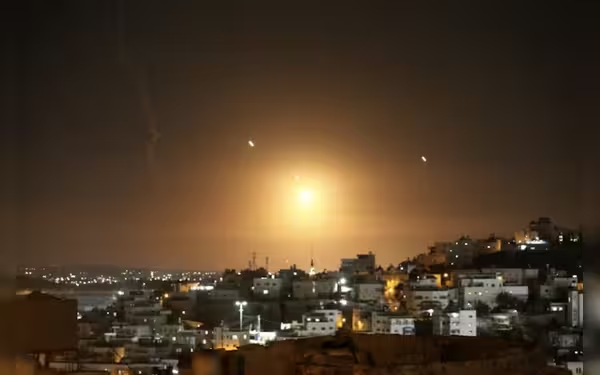Saturday, October 5, 2024 10:33 PM
Israel-Iran Conflict Escalates to Open Warfare
- Iran launches direct attack on Israel amid escalating tensions.
- Israel's military response remains restrained despite provocations.
- Conflict impacts regional stability and international relations.
 Image Credits: asiatimes
Image Credits: asiatimesThe Israel-Iran conflict escalates as Iran attacks Israel, marking a shift to open warfare with significant regional implications.
In recent years, the long-standing conflict between Israel and Iran has escalated significantly, marking a shift from covert operations to open warfare. Historically, these two nations have been engaged in a "shadow war," characterized by secretive actions and indirect confrontations. However, recent events have brought this conflict into the public eye, making it clear that both sides are now actively involved in military engagements.
On October 1, 2024, Iran launched a substantial and direct attack against Israel. This aggressive move was reportedly in retaliation for Israel's assassinations of key figures in Hamas and Hezbollah, namely Ismail Haniyeh and Hassan Nasrallah. This attack was not an isolated incident; it was the second major assault within a six-month period. The first attack, which occurred on April 13, involved over 300 ballistic and cruise missiles, as well as attack drones. Despite the scale of this assault, it resulted in minimal damage to Israel, leading to a restrained military response from the Israeli forces.
Initially, many observers believed that both nations might prefer to de-escalate the situation. However, the dynamics have changed dramatically. Following the April attack, Israel's military response was limited to an airstrike targeting a single Iranian air defense system. This measured approach seemed to suggest a desire for restraint. Yet, as Israel continued its military operations, Iran's responses became increasingly aggressive, pulling the conflict back into the spotlight.
With Hamas weakened in the Gaza Strip, Israel's military leaders expressed their readiness to confront Hezbollah, the Iranian-backed militant group. This shift in focus was evident after the assassination of Haniyeh in Tehran on July 31, 2024, which was perceived as a direct challenge to Iran's authority. Despite Ayatollah Khamenei's promise of a "harsh response," Iran remained inactive until September, raising questions about its commitment to retaliate.
However, Iran's restraint did not extend to its reaction to Israel's operations against Hezbollah in mid-September. Israel initiated a covert operation aimed at disrupting Hezbollah's command structure, followed by airstrikes that targeted the group's leadership, including Nasrallah. This series of events has further complicated the already tense relationship between Israel and Iran.
As the situation continues to evolve, it is essential to recognize the broader implications of this conflict. The ongoing hostilities not only affect the nations directly involved but also have significant repercussions for the entire Middle East. The potential for escalation remains high, and the international community must remain vigilant. Understanding the motivations and actions of both Israel and Iran is crucial for anyone seeking to grasp the complexities of this enduring conflict. As we move forward, it is vital to consider how these developments will shape the future of regional stability and security.













